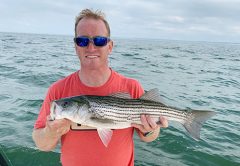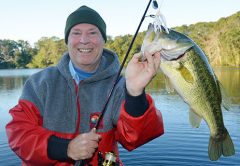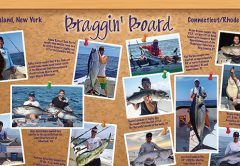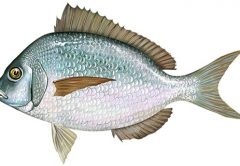I n the fall of 2009, I published an essay on what I saw as the major threats to a then-flourishing winter cod fishery off Block Island. Because that rebounding cod population represented sorely needed revenue for a party boat fleet that had been brought to its knees by a host of regulatory misfires, I elected to publish the piece—one of the more strident condemnations of fishermen and regulators I’d ever written—in the Coastal Conservation Association’s Tide Magazine, where I was reasonably sure I could memorialize the words in print without causing massive damage to the industry. Despite some concerns that the piece would make the rounds anyway, I sent it off and filed it in my records as a kind of future “I told you so.”
I ran across a PDF of the layout not too long ago—I’d forgotten about it— and read it quickly. I was struck, almost nauseated by a whole host of eerie similarities between that cod situation and the immediate big-bass scenario more than five years later within earshot of the same island.
One of the key points of overlap is a section of the essay that delves into the psychology of gold-rush fisheries—fisheries that get exploited at the highest level even when they’re surrounded by long-range conservation concerns. While I’m not in the habit of quoting myself, I’m including the following paragraph because (1) I doubt anyone reading this has seen it before and (2) I don’t think I could come up with a better way to word the idea:
“A common thread running through every incident of quote-unquote localized depletion is the fishing community’s failure to restrain itself. Each player in the specific fishery gets in on the act because every other player is in on the act. Some know that participating in the event is morally or environmentally shaky. Then again, the fish will get wiped out anyway: where’s the incentive, individuals wonder, for ‘me’ to abstain, when fish are doomed anyway? It’s better to wait, historical precedent tells us, then blame slow-or non-moving regulators.”[from Tide Magazine, September/October 2009]
It’s the last bit of the above that raised hairs on the back of my neck when I reread it recently. This season, after a few years of knock-down-drag-out arguments with friends (many of whom fish the Island, which has enjoyed wide-open fishing right through precipitous declines almost everywhere else) over the actual state of our striped bass resource, I’m finally starting to sense a shift in attitude. I get the feeling even the holdouts are starting to get seriously uneasy about the severely lopsided fishery off Block.
Since late June, folks have been catching huge bass in big numbers. On a rough average, these fish have ranged from around 25 to 50 pounds, with many larger but very few fish under 20 pounds. We’ve all been writing and reading about this part of the striper problem for years now, so there’s probably no need to beat it up again here. Suffice it to say that when you’re catching heavyweights exclusively, you’re looking at a stock with no future.
What does bear repeating—what is so perverse—about the immediate situation is the way the fleet is hitting that resource (by “fleet,” I mean the sum of all parties vying for a share of the available striped bass—sport fishermen, party/charter boats, spear fishermen, etc.). By one friend’s loose count, there were nearly 200 boats crawling all over the high ground off Block Island’s SW Corner on Sunday, July 20; the next day, in addition to maybe 75 rod-and-reel boats, the same skipper counted seven dive boats with spear fishermen in the water (shooting fish in the proverbial barrel).
Without even getting into what fish are being removed within the legal possession limits, a big number by itself, huge numbers of guys have been fishing for the open commercial market in Massachusetts (down, on the “open” days, from 30 fish per day to ten fish) while others, armed with commercial tags from New York, have been running staggering quantities of meat westward to Montauk and other East End ports on Long Island. Needless to say, there are quite a few fish going to “pure” black-market outlets in states that do not allow commercial sale of bass.
Given the serious shortage of market-sized bass elsewhere up and down the coast, the open, “above-board” markets have been paying top dollar—by some recent reports, north of $4 per pound. Of course, since RI striped bass is closed, none of the bass going to market from the Island are legal.
With the total lack of federal-waters fishery enforcement monies, the US Coast Guard has been making no visible attempt to patrol the three-mile EEZ line, so cheating there has been rampant. Worse, the states—most conspicuously RI and MA—have had near-zero presence at the Island or along the state lines where the lion’s share of laws are being broken. On one level, clearly, this is a staggering enforcement problem. And a long shadow of the ASMFC’s continued unwillingness to take necessary steps to rein in a fishery out of control.
But getting back to the Tide essay, I’m not willing to lay the entire problem at the feet of marine patrols or fishery regulators. The real problem is fishermen, our chronic failure to restrict our own practices even when we are all becoming increasingly certain that killing big bass in big numbers is bad ju-ju at this fragile point in bass-fishing history.
“I haven’t seen a single small fish at the Island in weeks,” said one of my sources, a guy who has been clocking fish day after fishable day for charter clients. “They’re all 25 to 50 pounds, eight or ten of them a day for us when we put the time in—it’s getting scary.”
Of course, no one currently making striper revenues at the Island is about to back off for the good of the resource, and I’m afraid I understand their logic: The fish are getting crushed—have been for more than a month, and will be until they get cleaned out or move on, or weather cranks up and chases boats off the water. The boats that are functioning within the law are not about to turn their energies elsewhere so the veritable flotilla of black-market guys can pound the resource into oblivion with no legitimate competition.
Our reward when all the carnage is over and a hobbled population of bass limps west and south this fall will be that many less big fish before we land on all those year classes that never made it in the Chesapeake. If history is any indication, we will then rationalize all of the idiocy away on “cycles:” Block Island got really, really good then fell apart for reasons beyond our control (recruitment failure).
I hate to say it, but after what has happened the last few seasons at Block Island, I’m starting to wonder whether we deserve the dark days that almost certainly lie somewhere ahead. I hope to hell I’m dead wrong.
In the meantime, you might consider reporting to the appropriate enforcement agency any suspicious fishing activity you see at the Island: No one likes a rat, but if this thing crashes again, I don’t want that to be in the name of a few morons lining their pockets in absolute defiance of the most basic kind of forward thinking.
[easy-social-share]










